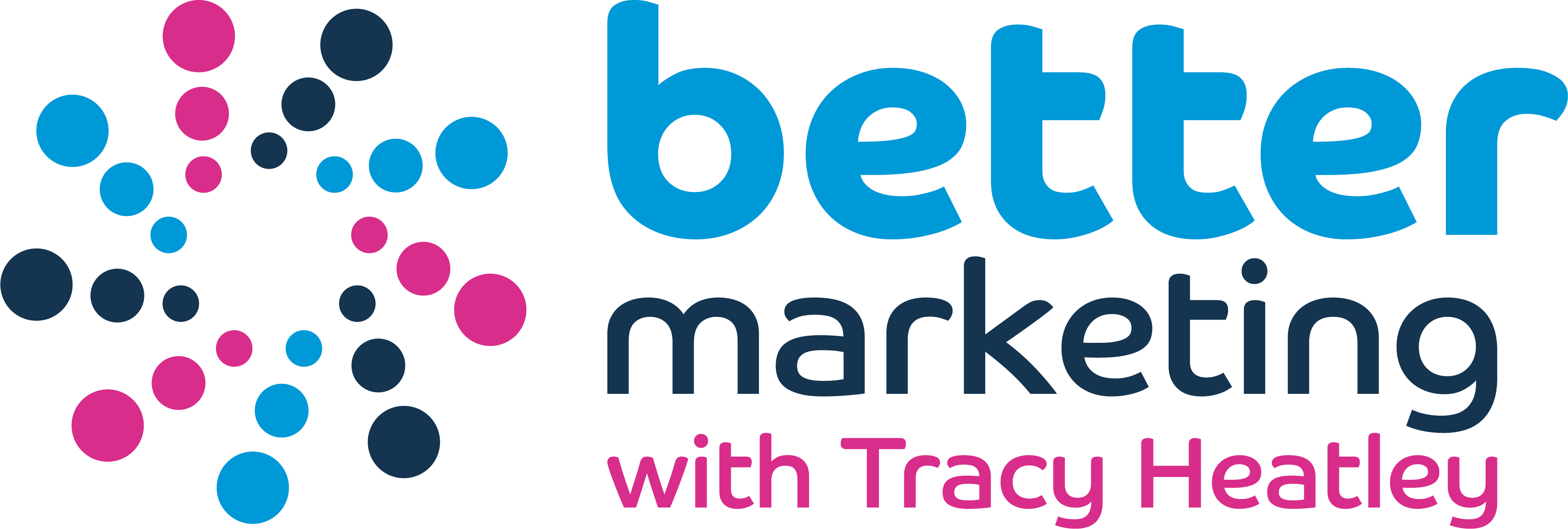AI Marketing Foundations: Building an Effective AI Strategy is the basis of this Better Marketing podcast episode. Plus, the transcript if you prefer to read rather than listen.
AI Marketing Foundations Introduction
Hi, I’m Tracy Heatley, and welcome to this podcast episode of Better Marketing – Marketing Magic in Minutes.
In the next ten minutes, we’ll embark on a journey into the realm of Artificial Intelligence—or AI for short— and its increasing influence on your marketing. We’ll examine what AI truly is, how it can enhance your marketing efforts, and why a robust AI marketing strategy is vital for long-term success.
and its increasing influence on your marketing. We’ll examine what AI truly is, how it can enhance your marketing efforts, and why a robust AI marketing strategy is vital for long-term success.
Whether you’re entirely new to AI or currently using it and seeking to refine your strategy, this episode will help establish the foundations for understanding and implementing AI in a practical, effective—and most importantly—responsible way.
What is AI?
Let’s start with the basics. Artificial Intelligence refers to the simulation of human intelligence in machines—systems that are programmed to think, learn, and adapt like humans. In marketing, AI can be used to analyse data, predict trends, personalise content, and automate tasks.
It’s about increasing efficiency, improving targeting, and delivering better customer engagement—without relying on manual effort at every step. And the benefits are huge. AI can transform your marketing by delivering precision at scale.
From segmenting audiences and delivering personalised messaging to optimising campaign timing and even automating customer service via chatbots, AI empowers you to do more with less. There’s never been a better time for small businesses to embrace AI.
Why You Need an AI Strategy
Jumping into AI without a clear strategy is like riding a bike with no handlebars—risky, wobbly, and bound to go off course.
A defined AI strategy ensures your tools and efforts align with your wider business goals. Without one, your activities can become disjointed, your resources wasted, and valuable opportunities missed.
So here are a few key considerations to help you start building your AI strategy. These are some of the areas I cover in more detail with clients during consultations, but they’re also a great place to begin on your own.
Define Your Goals
What exactly do you want AI to help you achieve? Whether it’s boosting customer service, increasing sales, or optimising your campaigns, having a clear set of goals is essential.
Understand Your Data
AI is only as good as the data it works with. Make sure you have access to reliable, quality data—and understand its limitations.
Choose The Right Tools
Not every AI solution will be right for your business. Choose tools that integrate well with your current systems, can scale as you grow, and are easy to use. You may need one tool, or a combination—it’s about what suits your business best.
Skills & Training
Whether you’re a sole trader, managing a team, or outsourcing, you and your team must understand how to use AI effectively. That includes its capabilities, limitations, and how to get the best out of it. Ongoing learning and development is essential. Make sure that you train your AI appropriately.
Ethical & Legal Considerations
This is something I’m very passionate about. With great power comes great responsibility.
When using AI, it’s crucial to address ethical and legal issues. How will you protect data privacy? How will you ensure your AI tools don’t reinforce bias? Garbage in, garbage out—and AI learns from what you give it. So think carefully about how you’re using it and what you’re feeding into it. Learn how to become a good AI Prompt Engineer but always be mindful about what you share. Remain legal and ethical at all times.
And don’t just think about this—build it into your strategy from the start.
Internal Communications
Success with AI isn’t just about the tech—it’s about your people. Communicate clearly with your team about what you’re doing, why you’re doing it, and how it will benefit them and the business.
If there’s concern about roles becoming redundant, address it. Show how AI can support, not replace. Outline clear guidelines, boundaries, and training requirements so everyone knows where they stand.
Internal marketing is just as important as external communication—especially when it comes to new tools and technologies like AI.
In Summary
AI can have a significant positive impact on your marketing—but only when used with clarity, responsibility, and strategy. Start with clear goals, get the right tools and training in place, and always consider the ethical implications of how you use it.
If you’d like to take the next step and develop a tailored AI marketing strategy for your business, I offer three-hour online AI sessions, as well as free discovery calls to explore how AI could work for you.
In the meantime, be sure to subscribe to this podcast, leave a review, and download your free copy of A Business Owner’s Roadmap to a Better Strategy from my website at tracyheatley.com. Use the code POD2025 when downloading the guide and you’ll be entered into a draw to win a free Power Hour with me—worth £275—which you can use to explore anything from marketing strategy to AI implementation.
A Final Note From Tracy Heatley
I’m Chartered Marketer, Tracy Heatley, one of the world’s first CIM-certified AI Marketing Specialists. I hope you’ve found these AI Marketing Foundations: Building an Effective AI Strategy insights useful. My website offers plenty more free resources, blogs, and podcasts to help you continue building your marketing success.
you’ve found these AI Marketing Foundations: Building an Effective AI Strategy insights useful. My website offers plenty more free resources, blogs, and podcasts to help you continue building your marketing success.
Thanks again for tuning in to Better Marketing – Marketing Magic in Minutes.
Next time, we’ll discuss enhancing customer engagement with AI, so don’t miss it.
Until then—Remember, Better Marketing means Better Business.
